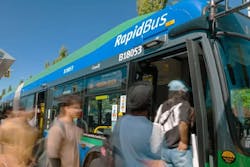Public transit becoming primary mode of transportation in Metro Vancouver
New data from TransLink’s 2024 Transit Service Performance Review (TSPR) shows more people in Metro Vancouver are choosing public transit over driving as their primary option to get around. According to the data, there were 7.7 million more trips on transit in 2024, an increase of more than three percent over 2023, outpacing a one percent increase in driving across the region.
“As Metro Vancouver continues to grow, more people are turning to transit instead of driving, which is a reflection of our system’s reliability,” said TransLink CEO Kevin Quinn. “Our 2025 Investment Plan is key to keeping this momentum going and meeting the demand of a growing region.”
The TSPR is an annual snapshot that tracks patterns and trends of how and where people are using transit across the network. TransLink notes driving data was based on estimated vehicle crossings from eight major bridges and the George Massey Tunnel.
Regional trends
- TransLink says it continues to rank among the highest-performing transit agencies in North America, as it is the second highest per capita transit ridership in Canada, surpassing the Greater Toronto and Hamilton Area (GTHA) and just behind Greater Montreal, and the third highest total bus ridership across all Canadian and American transit agencies despite a smaller population than most agencies.
- More major events at BC Place and Rogers Arena resulted in a growth in ridership by 29 percent at Stadium–Chinatown SkyTrain Station in 2024. The Taylor Swift concerts brought in record-breaking ridership, as Stadium–Chinatown saw the most riders ever recorded over a three-day period, with 116 percent ridership increase at Stadium–Chinatown and a 64 percent increase in SeaBus ridership.
- RapidBus drove significant ridership growth in 2024, making up 15 percent of all bus boardings across just six routes. Four of the RapidBus routes were among TransLink’s top 10 most used routes. Last year RapidBus routes averaged 20,600 daily boardings in 2024, more than five times the average daily boardings of the average local bus route (3,900 boardings).
Subregional highlights
Ridership south of the Fraser (Surrey, North Delta, White Rock, the city of Langley and the township of Langley) grew by 11.4 percent, which was more than anywhere else in Metro Vancouver. South of the Fraser River faced significant overcrowding, and new service from the R6 RapidBus and additional bus service approved in the 2024 investment plan helped ease pressure. The 2025 Investment Plan will further expand service south of the Fraser by adding or upgrading seven routes and increasing service on 25 other routes. The Waterfront Station surpassed 10 million boardings last year for the first time since 2019, and the 99 B-Line is still the busiest bus route in the region, followed closely by several RapidBus routes.
Strong performance for HandyDART
TransLink notes a separate deep dive into HandyDART finds high user confidence:
- Customer satisfaction was 8.8 out of 10, an increase from 2023 and the second highest score ever recorded.
- 99.6 percent of trips requested by HandyDART customers were delivered.
- 91 percent of all trips arrived on time.
- 1.2 million HandyDART trips were delivered in 2024.
- The majority of HandyDART trips delivered in 2024 were for day programs (36 percent), medical appointments (16 percent) and dialysis (14 percent). The remaining trips supported work, education and miscellaneous purposes.
Looking ahead, the 2025 Investment Plan will be implemented to better meet the needs of Metro Vancouver residents. Starting this September, TransLink will expand service, alleviate overcrowding and provide improved access to previously under-served areas.
